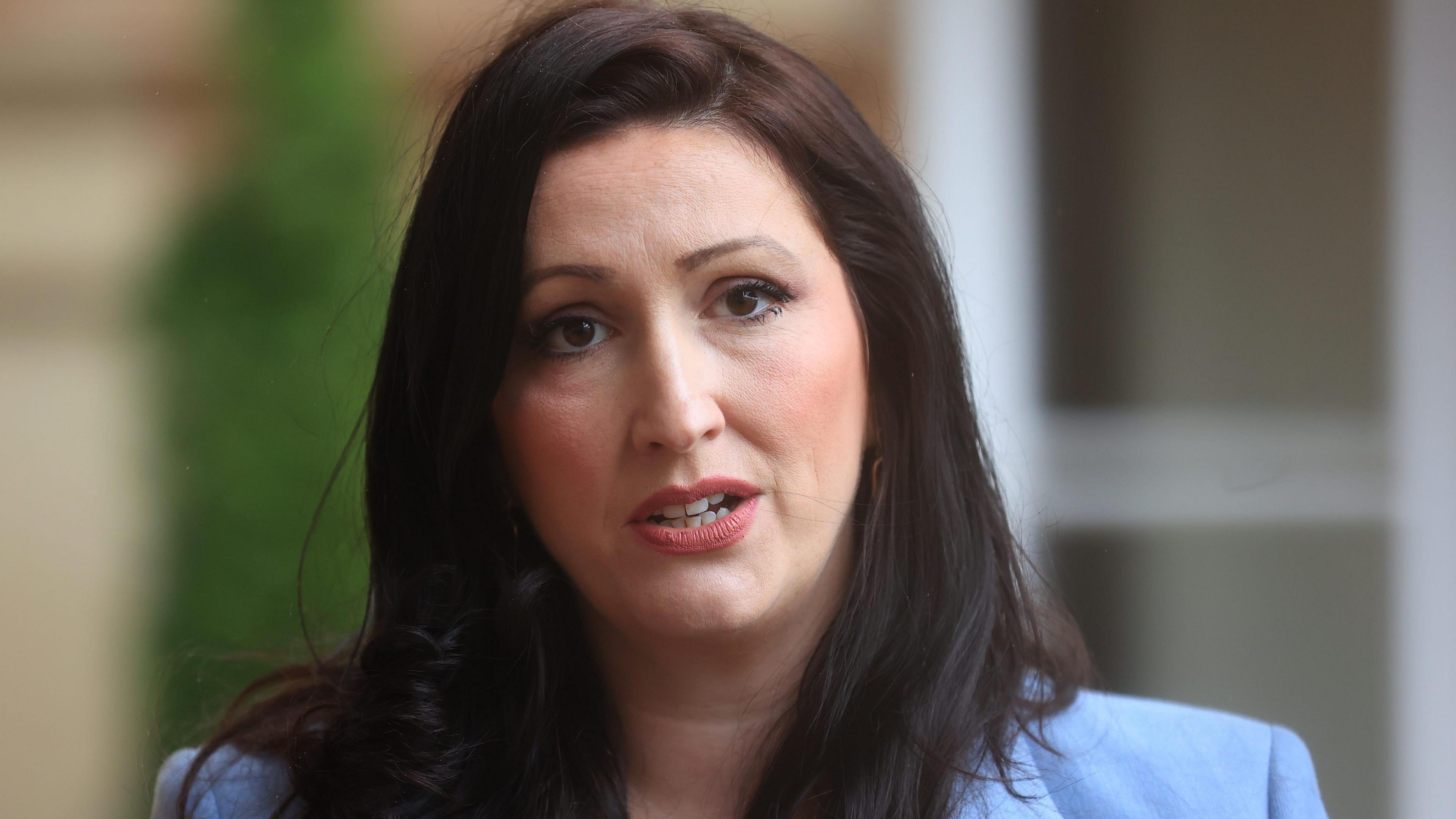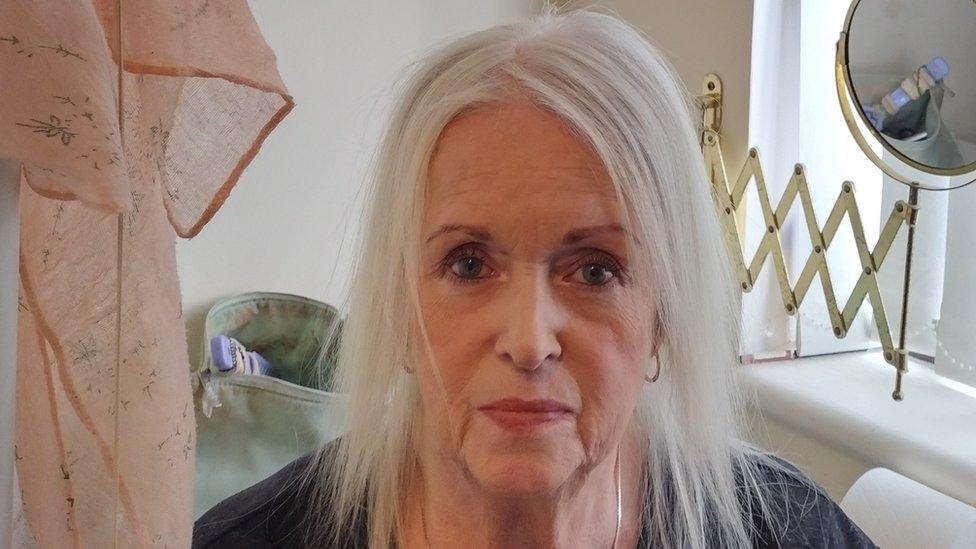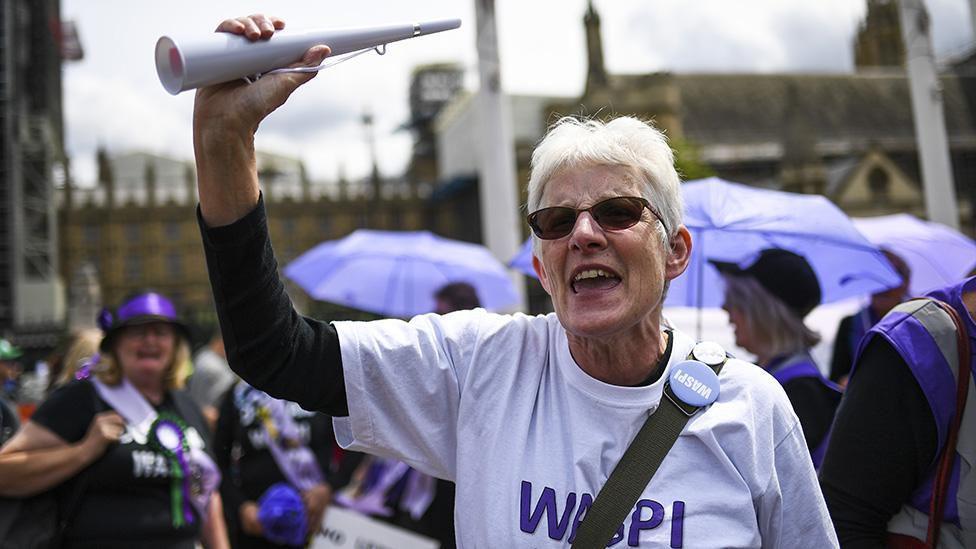Waspi women treated 'appallingly' - Little-Pengelly

Emma-Little Pengelly said her mother is a Waspi woman
- Published
The UK government's decision not to pay compensation to millions of women affected by an increase in the state pension age has been branded "deeply disappointing" by the deputy first minister.
Campaigners from the Women Against State Pension Inequality (Waspi) group say 3.6m women across the UK, born in the 1950s, were not properly informed of the rise in state pension age to bring them into line with men.
Posting on social media, Little-Pengelly said: "My mother is a Waspi woman and she and many women were treated appallingly and shabbily and deserve that to be recognised."
In March, a parliamentary ombudsman recommended compensation of between £1,000 and £2,950 for each of those affected.
However, on Tuesday, Work and Pensions Secretary Liz Kendall rejected the recommendation.
Kendall said the bill of about £10.5bn would not "be fair or proportionate to taxpayers".
Waspi had pushed for pay outs of up to £10,000 each for people affected - and the chair of the group has called the decision an "insult".
'A kick in the teeth'
Shelley Leggett, 68, who is a member of Waspi NI, said: "To be told we're not even worthy of [£2,000] is a kick in the teeth".
"How are you supposed to make up six years' loss of pension?" she said.
Ms Leggett, who is now retired on her state pension, told BBC News NI she was "very disappointed in the Labour government" who had previously "appeared to promise compensation".
"There are women who had to sell their homes or who had left work aged 58 and had to find other jobs," she added.
"We're taxpayers. We paid for the people in front of us. That's the system."
When Waspi was first set up in 2015 about 77,000 women in Northern Ireland were affected by the pension changes, Ms Leggett said, a number will have increased since.
She said thousands of women have now died and "never received a penny".
'Disregard for justice'
Alliance MP Sorcha Eastwood said the decision was "a cruel betrayal of the millions of women who have already endured financial hardship and emotional distress due to the government's failure to adequately communicate state pension age changes".
"To apologise but then refuse compensation adds insult to injury and shows a blatant disregard for justice," she added.
"These women were denied the information and time needed to plan for their futures."
What is the row about women's pensions?
- Published18 December 2024
SDLP MP Claire Hanna said that the government had failed Waspi women, adding that the decision will "force [them] back to the courts".
She said the women were given "some hope" by the parliamentary ombudsman's report after years of campaigning, and the decision "will have come as a real blow".
"Women consistently carry a disproportionate burden of austerity and that generation in particular fell further behind their male counterparts in wage growth, rates of occupational pensions and financial security in retirement," she said.
"These factors, plus the finding of maladministration, clearly merited recognition by the current government."

Northern Irish Waspi campaigners previously took their protest to Westminster
The compensation recommendation came in a report from the Parliamentary and Health Service Ombudsman earlier this year, which found that the Department for Work and Pensions failed to adequately communicate the changes regarding when women could receive the state pension.
The government accepted a finding of maladministration and apologised, but said it could not justify paying compensation.
Speaking on Wednesday, Chancellor Rachel Reeves added: "I understand that women affected by the changes to the state pension age feel disappointed by this decision, but we looked in full at the ombudsman recommendations and they said that around 90% of women did know that these changes were coming.
"And as chancellor, I have to account for every penny of taxpayers' money spent."
The Waspi campaign said that both Kendall and Reeves previously spoke of the "injustice" that the women faced.
Prime Minister Keir Starmer also defended the decision during Prime Minister's Questions on Wednesday, arguing that the taxpayer "simply can't afford the tens of billions of pounds" in payments.
He added that "90% of those impacted knew about the changes that were taking place".
When did the rules change?
From 1948 until 2010, the age at which men could receive their state pension (provided they had made enough National Insurance contributions) stood at 65.
During that same period the pension age was lower for women - they could draw their pension once they reached 60.
In 1995, legislation was passed to gradually equalise the rules for men and women, external, aiming that by 2020 everyone would have to wait until their 65th birthday.
But in 2011, this process was accelerated, as the government brought its gender equalisation target forward to 2018.
In 2015, the Waspi group was established. It says it is not against gender equalisation of the state pension age, but argues the way it was being implemented was unfair and women affected were not told properly.
In 2020, the state pension age for both men and women increased to 66.
Related topics
- Published22 March 2024

- Published18 December 2024
